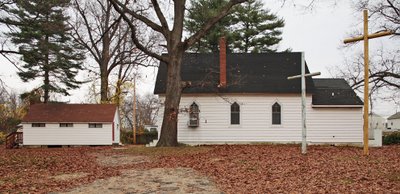
 "In 1917 Harford's decades of sunny, prosperous, and seemingly unending tranquility were abruptly interrupted by America's entry into World War I. Many Countians volunteered for and saw service in Europe during the conflict, it seems arguable that the greatest affect the Great War had on Harford came in October 1917, when the federal government condemned the entire Gunpowder and Bush river necks -35,211 acres of land and 34,000 acres covered by water or about 60 square miles in all. Heretofore, as historian Keir Stirling has written, these stretches of southern Harford County "were locally known as the 'Garden of Eden,' where an excellent grade of shoe peg corn had been grown for many years. Many area farmers were able to produce 125 bushels of corn to the acre. The Baker family and others engaged in the profitable canning industry were producing about 300,000 cases of shoe peg corn and tomatoes worth approximately $1.5 million annually by 1917 .... The famous Poole's Island peaches were ... were canned locally and considered to be of high quality. Local fishing was another industry worth $700,000 a year."
"In 1917 Harford's decades of sunny, prosperous, and seemingly unending tranquility were abruptly interrupted by America's entry into World War I. Many Countians volunteered for and saw service in Europe during the conflict, it seems arguable that the greatest affect the Great War had on Harford came in October 1917, when the federal government condemned the entire Gunpowder and Bush river necks -35,211 acres of land and 34,000 acres covered by water or about 60 square miles in all. Heretofore, as historian Keir Stirling has written, these stretches of southern Harford County "were locally known as the 'Garden of Eden,' where an excellent grade of shoe peg corn had been grown for many years. Many area farmers were able to produce 125 bushels of corn to the acre. The Baker family and others engaged in the profitable canning industry were producing about 300,000 cases of shoe peg corn and tomatoes worth approximately $1.5 million annually by 1917 .... The famous Poole's Island peaches were ... were canned locally and considered to be of high quality. Local fishing was another industry worth $700,000 a year."
Overnight all this changed as everyone living on those bay-front lands had to move to make way for the poison-gas testing facilities Washington felt the war demanded. The former landowners - the Cadwaladers, Bakers, Mitchells, and others - received some payment from the government for their lost acres and many of them then purchased other farms and resumed their lives. The workers, generally black tenant farmers, received nothing and were forced to move from the source of their livelihoods. Many such displaced families, including the Dembys and Gilberts, settled in a stretch of land near Magnolia; the houses, church, and school they built created the community now called Dembytown (HA-1603, HA-1604)." From the 1998 Historical Preservation Element.
Nov 15, 2006
Dembytown
Subscribe to:
Post Comments (Atom)








0 comments:
Post a Comment